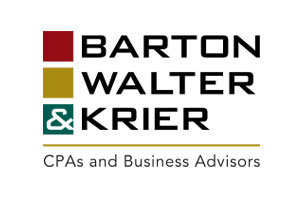What to Know with Interest Rates Climbing
October 27, 2022 | Barton Walter and KrierTo help get a handle on inflation, the Federal Reserve System — also known as “the Fed” — recently announced it is adjusting interest rates. Those changes likely will affect anyone trying to borrow or save money. Keep reading to learn what to know with interest rates climbing.
Rates on the Rise
In mid-June, the Fed disclosed its intention to increase interest rates 0.75 percentage point, after an increase of 50 basis points one month prior. A basis point is one one-hundredth of a percentage point.
With rates right now on the rise, it’s becoming increasingly more expensive to borrow money. And because of that added cost, consumers tend to spend less, helping to curb inflation. Some loans and lines of credit might be affected, depending on the type of loan or rate status — fixed or variable.
A fixed-rate loan — common with home mortgages — is unaffected by changes in the market. The interest is consistent throughout the loan’s term, keeping risk to a minimum. This allows for steady planning and budgeting because the borrower makes the same payment each month.
On the other hand, the interest on a variable-rate loan fluctuates as the market changes. These loans often have lower interest than fixed-rate loans but also present greater risk. When interest rates go up — like right now — so does the cost of borrowing with a variable-rate loan.
What’s the Significance of Increased Rates?
Interest rates could be on the rise for some time, which likely will affect a number of financial situations.
Housing. Those looking to purchase a home will find higher prices and more expensive financing.
Credit cards. The interest on variable-rate credit cards will be higher to reflect the same change in the federal funds rate. Cardholders will pay more for outstanding balances.
Bank accounts and CDs. With interest rates on the rise, banks will offer higher dividends on money market and savings accounts. But each bank operates differently, so the immediacy with which they respond will fluctuate. Locked-in CD rates will remain consistent throughout the CD’s term.
Deciding Whether to Consolidate
Debt can often feel like a trap. If you have extensive outstanding balances with high interest, paying off that debt may seem like a never-ending battle. Consolidating your debt could be an option, but how do you know if now is a good time?
You may want to consider debt consolidation if you:
- Have numerous monthly bills — Consolidation takes a lot of monthly payments and combines them into one. The lender pays off each debt, leaving you with one payment each month that goes toward the consolidation loan.
- Pay high interest rates — High interest often means borrowers can only make monthly minimum payments, which pays the interest and rarely the principle. That means it can take longer to pay off a debt. Oftentimes a consolidation loan will offer a lower interest rate, helping borrowers pay off the loan faster.
- Have good credit — Before applying for a consolidation loan, check your credit score to make sure it’s in good standing. Your credit score will help determine the interest rate on a consolidation loan; a higher score helps you qualify for a lower rate.
Consolidating debt can help you pay it off faster. But analyzing spending patterns can help you learn to avoid accumulating future debt. Barton, Walter & Krier can provide you with helpful consulting solutions.
Trust the BWK Team
Now that you’re more aware of what to know with interest rates climbing, you might have additional questions. And we’re here to answer them. Put BWK’s big-firm knowledge to work for you and contact us to learn more about current and climbing interest rates and what you should watch for to protect and/or benefit your investments.

